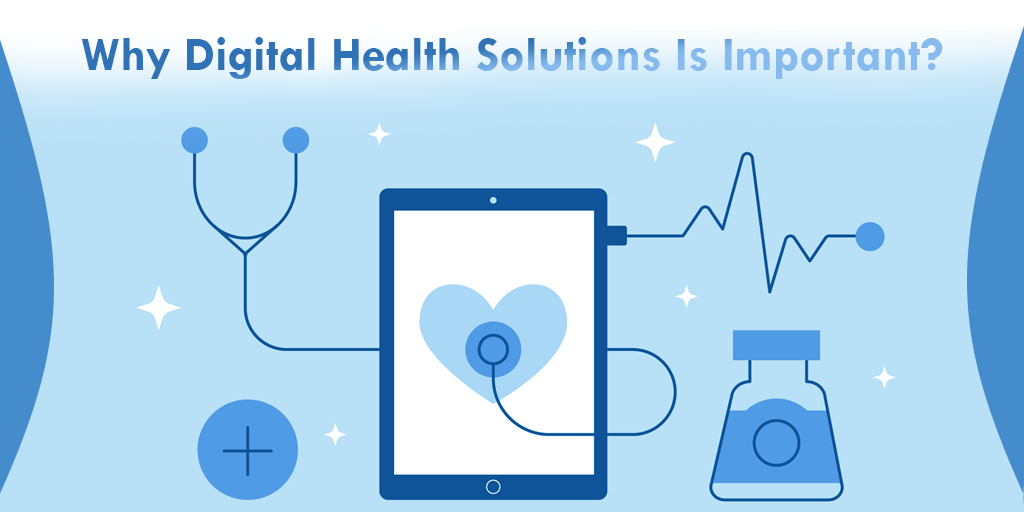Why Digital Health Solutions is Important?
The health sector has emerged as a vital part of one’s life. From mHealth to telemedicine, the sector is transforming like anything. The broad sense explains it as the utilization of technologies like health information technology (IT), wearable devices, telehealth, telemedicine, and personalized medicine to overcome the health issues more diligently. The article conveys a deeper sense of Digital Health. Readout why digital health Solutions is important in the healthcare industry?
Moreover, an amalgamation of Artificial Intelligence (AI) and Machine Learning (ML) in telecasting health reports is something that has taken digital health to some new extents. The technologies discussed above are issuing a helping hand to the physician or doctors to reach a phase of decision making.
What Are Digital Health Solutions?
The conjunction of digitalization with health, healthcare, living, and the society we live in to promote effective healthcare Practices delivery is known as Digital Health Solutions. The regimen includes the utilization of information and negotiation techniques to flourish an understanding of health problems.
Digital Health is an associative domain consisting of multiple stakeholders, physicians, scientists, etc. It includes both software and hardware solution and services, along with other digital technology advances.
Names of Different Digital Health Solutions:
Now the section expresses the trending digital ways adopted in the healthcare sector for better treatment and patient management possibilities:
- Telemedicine
- Wearable Technology
- AR & VR Technique
- Other Digital Health Solutions
Telemedicine platform as a Digital Health Solutions :
Telemedicine is the newest and most important criterion of digital health solutions. Platforms like VCDoctor and others are doing well in providing remote patient monitoring (RPM). VCDoctor is one of the pioneer tools which is HIPAA Complaint that helps in accessing remote patients and treatment.
Telemedicine mainly covers medical records, remote care, appointment booking, self-symptom checkers, etc. facilities. Telemedicine also accommodates online health records which are accessible to both patient and doctor at any time.
Wearable Technology:
Wearable advances come in various aspects i.e. smartwatches, on-body sensors, health bands, etc. Smartwatches and bands are the first choice of the users to keep track of health and other health issues.
The devices can be paired up with cell phones or other devices to give an analysis of the daily health status. Records like BMI, Blood Pressure, Heart Rate, Calories Burnt, Physical Activity patterns, etc. can be easily monitored with these devices.
With the new technological era, the telemedicine aspect is extending to smart bodywear, like patches, clothes, and accessories, etc. These wearable devices are utilized to track patient’s health status daily. By relying on the data obtained from these wearables, doctors and physicians can plan more significant outcomes.
Augment Reality (AR) & Virtual Reality (VR):
AR technology is utilized for constructing robust smart devices for healthcare professionals. The technology utilizes real-world experience and computer-based sensory information to provide health data.
Since the patient-oriented information comes from handy smart devices, Smart glasses are something that gives a fresh and hand-free augmented way of treating the patient. The applications can give the best outcomes like data-driven diagnosis, AR-Based patient documentation, advancing the treatment criteria for patients, etc.
Other Health-Related Solution:
Some more advances have paved the way to epic health treatments i.e. Assistive Technologies, rehabilitation robotics, and unobtrusive monitoring sensors, etc. that can help people with some deformities. These functionalities are generated to be repeatable, replicated, and made up to any research data.
These were all the digital health solutions that have gained so much popularity in recent years. There is no rigid-working or any other aspect. The technology offers more convenient and accurate results. Now the section will conclude the benefits of such technology in the healthcare industry.
Why Digital Health is important?
Digital Healthcare Tools is the more precise way of getting an account of a patient’s health. It gives access to data and gives more control over the health parameters. Simultaneously, the technique provides real opportunities to improve medical reports and enhance efficiency.
After getting a better sight to the characteristics, let us understand the benefits of utilizing these Digital Health Solutions in the healthcare sector:
- Discard inefficiencies
- Improved Accessibility
- Cost-effective
- Improvised Quality
- Personalized medication for patients
1. Reduce inefficiencies
When dealing with patient’s data on papers or charts or graphs, etc. it becomes less effective to maintain all the records. Digitalization in every sector works like an elixir that reduces the paper works and magnifies the digital health records for better diagnostic opportunities.
2. Improved Accessibility
It enhances the accessibility of data for both sides i.e. patient and doctors. One can access their health records at any time and physicians can predict the best treatments. For better results, these records are shared via Electronic Health Record (EHR) to the best doctors of the world for better cures and diagnosis of diseases.
3. Digital Health Solutions is Cost-Effective
Digital health solutions are so much based on the low-cost aspects. One can drive effective medical reports by investing less money. It also reduces the costs of using the machines, electronic devices as the reports are generally obtained from the tools themselves. Various platforms like VCDoctor for Telemedicine, and other specialists have developed tools to shorten the money invested in generating health records.
4. Improvised Quality
The medical side of the patient has been improved enormously after the involvement of digital health tools. These technologies like wearable devices, artificial intelligence, mHealth, Telemedicine, etc. give super flexibility in obtaining the most accurate health statistics of the patients. Simultaneously on the physician end, the data gives them accessibility to better diagnosing the patient’s health, personalized medicines, etc.
5. Personalized Medication to Patients
The medication offered to the patients with the help of solutions like RPM, mHealth, Telemedicine, etc. is personalized according to the need. During the clinic visit, doctors might prescribe medicines that may not be that effective (as physicians deal with multiple patients). But after availing of these options, physicians can better understand the health state and suggest some more personalized medicines to the patients.
What is Real-Time Data in Healthcare?
The real-time data in the healthcare segment enables physicians to get round-the-clock statistics of the patient’s health. By using these statistics, the healthcare providers can obtain proactive care, improvised health results reduce hospital re-admissions, and also reduces costs of getting medical attention.
Conclusion:
To end up, these were details on Digital Health Solutions. The growth of healthcare in the light of digitalization seems sky-rocketing soon. People started approaching physicians via different tools like Telemedicine, mHealth, RPM, etc. Physicians are also convinced with the technology as there are a lot more opportunities to treat maximum patients with 100% health outcomes.





After the covid pandemic, digital health solutions are very important for every country. This post contains all information is facts and digital health is the future.